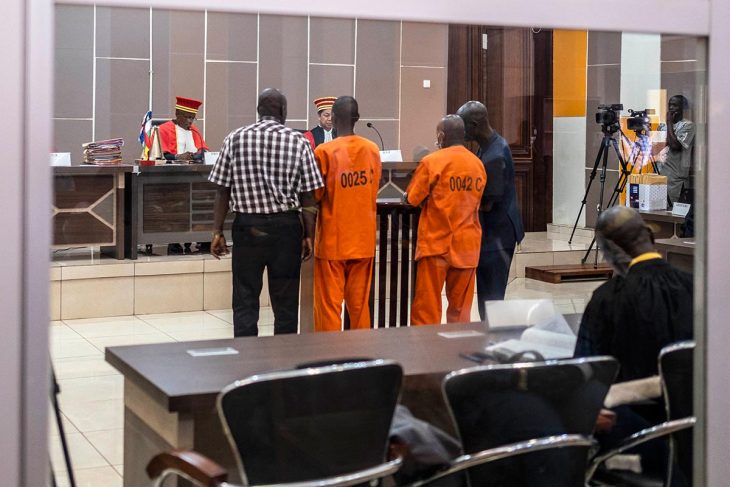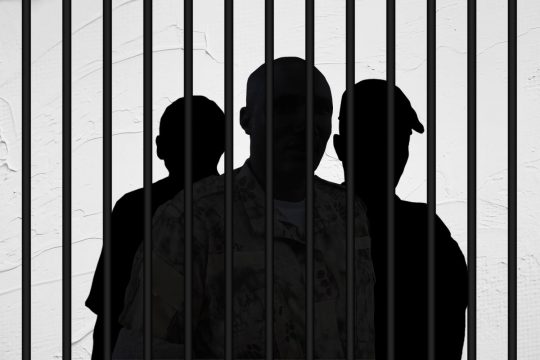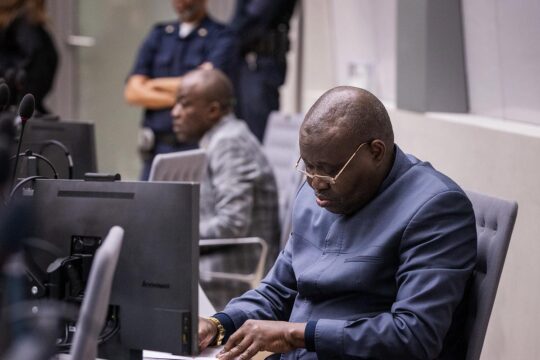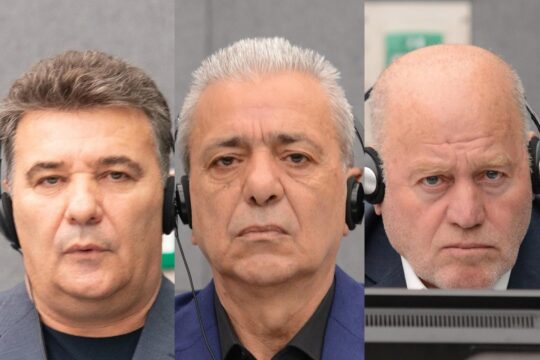During hearings that lasted nearly seven months, defendants Adoum Issa Sallet, Ousmane Yahouba and Tahir Mahamat blamed each other for crimes committed in the villages of Koundjili and Lemouna in the northwest of the country on May 21, 2019. These massacres that caused the death of more than 40 civilians were at the heart of the first trial to be held before the Special Criminal Court (SCC), a hybrid court made up of Central African and international judges created with UN support in 2015.
The three men are members of the armed group 3R (Return, Reclamation and Rehabilitation) and were arrested three days after the events. Their trial began in April. In his May 18 statement, Yahouba acknowledged that he was the deputy leader of the mission that went to the village of Lemouna to recover cattle stolen by members of Revolution Justice (RJ), another armed group. It was during this mission that 22 civilians were killed. Denying his direct involvement in the crime, Yahouba said he was ordered by Issa Sallet Adoum, also known as "Bozizé," to recover the stolen cattle by force if necessary. But he then chose to be an "intelligent bayonet", as his lawyer put it, and refused to carry out his boss's instructions to the letter.
Summary executions
Issa Sallet is said by the prosecutor to have been commander of the operations that led to the massacres. According to the prosecution, it was he who requested reinforcements from Abbas Sidiki, leader of the 3R movement. "In Lemouna, elements of the 3R armed group gathered the men, claiming they wanted to hold a meeting. They then tied them up and ordered them to lie face down on the ground, before opening fire on them at close range. In total, 21 civilians were shot and one had his throat slit in the bush as they retreated," said Alain Tolmo, deputy prosecutor of the SCC.
In addition to summary executions in the village of Koundjili, the 3R assailants also raped several women, according to the prosecution. They "positioned themselves at the entrances before executing 15 inhabitants and raping six women" including two minors, the prosecutor's office said.
Issa Sallet's lawyers deny his responsibility. They also believe that the context of the crimes does not allow the facts to be qualified as war crimes and crimes against humanity. For them, there was no confrontation at the time and the court should declare itself incompetent.
Victims divided between fear and hopes of justice
The victims seemed divided between the desire to know the causes of their misfortune and the fear of reprisals by elements of the 3R who are present in the region. "We are aware of the situation, but where we are, we still live with the rebels who have not disarmed. We want justice, but the contrast between insecurity and justice continues to affect the daily lives of victims here. It is important for everyone to steer clear, because here we continue to live with our executioners," said Armand, a resident of Koundili.
The fourth witness to appear - out of 23 who appeared between April and August - was one of four survivors. He narrowly escaped the Lemouna massacre. In court, he had difficulty expressing himself. This young man in his thirties could not bear to see the three defendants face to face.
"They don't even turn round to see if they actually recognize the person or not," explained Claudine Bagaza, a lawyer for the civil parties. "You have to understand that there is frustration, fear, a question of protection. They should have been psychologically prepared from the beginning. They are afraid, but the facts are there."
This trial is a first and modest result for the SCC, but the victims remain concerned about the slowness of the procedures. The cumbersome nature of the court's mandate increases their fears. Many observers also question the SCC's ability to handle its other cases.
Guilty
On October 31, the three men were convicted of murder, inhumane acts, and humiliating and degrading treatment as crimes against humanity and/or war crimes. Issa Sallet was also convicted in his "capacity as a military leader" for "rapes committed by his subordinates, constituting crimes against humanity and war crimes”. They were, however, acquitted of the crime of torture, as the chamber was "not convinced that the acts were of sufficient objective gravity to constitute the degree of suffering required for torture”.
In the summary of the judgment, the judges said that the systematic nature of the attacks was reflected in the modus operandi of the assailants, as well as in "the scorched earth tactics practiced during the reprisals" by 3R, which "are part of the 3Rs' plan to expand its area of influence and to control the seasonal migration routes of livestock”. The chamber also noted “the organized nature of the acts of violence and the improbability of their isolated and fortuitous nature”. The court deemed that the three men had the intention and the awareness of the attacks they were going to carry out, they "received orders to that effect and did not refuse to participate in the execution of this mission”.
The judges also noted "the persistence of the armed conflict and the intensity of violence against the civilian population since 2013" and the fact that "clashes between armed groups such as 3R, the Antibalaka, the RJs and government forces have been ongoing". Because the defendants have combatant status and acted "in the name of and on behalf of an organized armed group, during an official mission and in the execution of a well-defined ideological policy", they fall under the war crime charge.
"It's like therapy"
Issa Sallet was sentenced to life imprisonment; the other two were sentenced to 20 years. The judges considered as mitigating circumstances "the personal and family situation of the defendants, in particular their lack of education and the loss of their loved ones due to the conflict".
The convicts have three days to appeal the judgment. A hearing is scheduled for November 4 to address compensation and reparations. "We are very happy today with the SCC verdict. The court made a fairly firm decision," said Joseph Bindoumi, president of the Central African Human Rights League, who is now looking forward to the reparations hearing. "It is this part that interests us a lot, because for there to be true justice in a country the crimes that were committed must be repaired."
"Today’s verdict of the SCC is for us like therapy," explains Francine Evodie Ndemade, national coordinator of Victims of the Crisis in the Central African Republic (CNAV-CA). "I think it is already a strong signal to the perpetrators of serious crimes in the Central African Republic. The most important thing for us is to support the victims. The page of serious crimes and other rights violations has not yet been turned. The Court has just proven this and we dare to hope that other trials will take place to judge these crimes."







